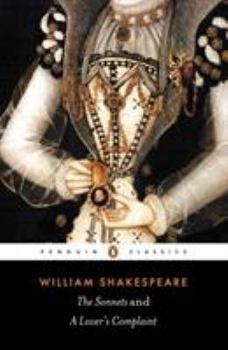The Sonnets and a Lover's Complaint
Select Format
Select Condition 
Book Overview
William Shakespeare is a global icon for his plays such as Hamlet, Macbeth and Romeo and Juliet, but his poetic meditations on love are among the most powerful and evocative poems ever written. This Penguin Classics edition of Sonnets and A Lover's Complaint is edited by John Kerrigan.
'Shall I compare thee to a summer's day?' The language of Shakespeare's sonnets has become inseparable from the language of love in English; but the force and tenderness of these poems is undiminished by age. When this volume of Shakespeare's poems first appeared in 1609, he had already written most of the great plays that made him famous. The 154 sonnets - all but two of which are addressed to a beautiful young man, 'Mr W.H.', or a treacherous 'dark lady' - contain some of the most exquisite and haunting poetry ever written, and deal with eternal subjects such as love and infidelity, memory and mortality, and the destruction wreaked by Time. Also included is A Lover's Complaint, originally published with the sonnets, in which a young woman is overheard lamenting her betrayal by a heartless seducer. In his illuminating introduction, John Kerrigan examines how the sonnets are intertwined, the ways in which these works have been interpreted and the themes running through them. This edition also includes further reading, commentaries on each poem, a textual history, variant and further sonnets and an index of first lines. If you enjoyed Sonnets and A Lover's Complaint, you might like John Milton's Paradise Lost, also available in Penguin Classics. 'Shakespeare led a life of allegory: his works are the comments on it'John Keats
Format:Paperback
Language:English
ISBN:0140436847
ISBN13:9780140436846
Release Date:January 1
Publisher:Penguin Books
Length:457 Pages
Weight:0.73 lbs.
Dimensions:0.9" x 5.1" x 7.8"
Age Range:18 years and up
Grade Range:Postsecondary and higher
Customer Reviews
2 ratings
Lord of my love, to whom in vassalage
Published by Thriftbooks.com User , 18 years ago
Thy merit hath my duty strongly knit, To thee I send this written embassage, To witness duty, not to show my wit. (Sonnet 26.) How to do justice to the legacy of literary history's greatest mind -- moreover in such a limited review? Forget Goethe's "universal genius" and his rebel contemporary Schiller; forget the 19th century masters; forget contemporary literature: with the possible (!) exception of three Greek gentlemen named Aischylos, Sophocles and Euripides, a certain Frenchman called Poquelin (a/k/a Moliere), and that infamous Irishman Oscar Wilde, there's more wit in a single line of Shakespeare's than in an entire page of most other, even great, authors' works. And I'm not saying this in ignorance of, or in order to slight any other writer: it's precisely my admiration of the world's literary giants, past and present, that makes me appreciate Shakespeare even more -- and that although I'm aware that he repeatedly borrowed from pre-existing material and that even the (sole) authorship of the works published under his name isn't established beyond doubt. For ultimately, the only thing that matters to me is the brilliance of those works themselves; and quite honestly, the mysteries continuing to enshroud his person, to me, only enhance his larger-than-life stature. The precise dating of Shakespeare's sonnets -- like other poets', a response to the 1591 publication of Sir Philip Sidney's "Astrophil and Stella" -- is an even greater guessing game than that of his plays: although #138 and #144 (slightly modified) appeared in 1599's "Passionate Pilgrim," most were probably circulated privately, and written years before their first -- unauthorized, though still authoritative -- 1609 publication; possibly beginning in 1592-1593. Format-wise, they adopt the Elizabethan fourteen-line-structure of three quatrains of iambic pentameters expressing a series of increasingly intense ideas, resolved in a closing couplet; with an abab-cdcd-efef-gg rhyme form. (Sole exceptions: #99 -- first quatrain amplified by one line -- #126 -- six couplets & only twelve lines total -- #145 -- written in tetrameter -- and #146 -- omission of the second line's beginning; the subject of a lasting debate.) Their order is thematic rather than chronological, although beyond the fact that the first 126 are addressed to a young man -- maybe the Earl of Pembroke or Southampton, maybe Sir Robert Dudley, the natural son of Queen Elizabeth's "Sweet Robin," the Earl of Leicester -- (the first seventeen, possibly commissioned by the addressee's family, pressing his marriage and production of an heir), and ##127-152 (or 127-133 and 147-152) to an exotic woman of questionable virtues only known as "The Dark Lady," even in that respect much remains unclear; including the nature of Shakespeare's relationship with the two main addressees, regarding which the sonnets' often ambiguous metaphors invoke much speculation. #145 is probably addressed to Shakespeare's wife; the closing coup
lover
Published by Thriftbooks.com User , 19 years ago
the site is fantastic and i am really found it trust worthy and logically created





